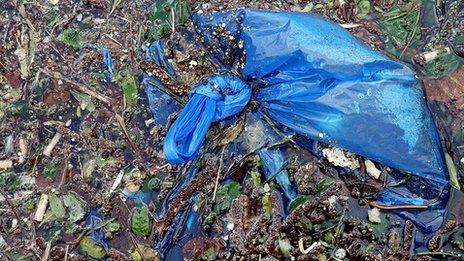Harrabin's Notes: Pay on plastic
- Published
In his regular column, BBC environment analyst Roger Harrabin takes a look at the issues around charging for plastic bags and what the UK government is doing about it.
PAY ON PLASTIC

Is a commitment on charging now dead in the water?
Is the government trying to wriggle out of a commitment on charging for throw-away plastic bags?
Green groups are drawing that conclusion following a bizarre "Yes Minister" exchange I've had on the issue with the Department for Environment, Food and Rural Affairs (Defra).
I wanted to check when Defra would decide whether or not England should follow Wales in mandating a charge for single-use bags.
Since the Welsh Government imposed a 5p charge last year (giving the cash to charity) there's been fall of up to 96% in single use bags in supermarkets.
Meanwhile in England, where Defra is still working on a voluntary scheme with retailers, there's been a 7.5% rise in the number of bags given out.
The environment minister Richard Benyon said in June that Defra would review the Welsh evidence and decide on bag charging in England during 2012. So I asked Defra's press office exactly when that decision would happen.
Here's an edited account of our long email exchange:
Defra: We want to work with retailers to help them lift their game to cut the number of bags they hand out. We are monitoring the results of the charging scheme in Wales and the outcome of the Scottish consultation on a charge.
Me: How long will you monitor the successful Wales experiment to determine that it's been a success?
Defra: I am not in a position to give a time frame.
Me: If there's no time frame people might think Defra wasn't really taking it seriously.
Defra: We are not going to put a time frame on this.
Me: Does Defra agree that Welsh charging scheme has cut bag use and enjoyed increased popularity?
Defra: We acknowledge that early results have shown a reduction in carrier bag use.
Me: So how long will you monitor before you decide whether to change?
Defra: You already have our statement (And so the elliptical conversation went on).
Trivial issue?
I asked Defra if the refusal to confirm a time frame raised doubt over Mr Benyon's commitment, external.
The answer was a firm "no". But when I asked if this meant Defra would indeed keep Mr Benyon's promise to make a decision this year, I couldn't get a firm "yes".
Defra - guided, it seems, by the Treasury's business-friendly deregulation agenda - says it still hopes that the voluntary approach will work in England, even though evidence suggests that it's failing.
And their professed hope looks increasingly disingenuous to environmentalists since the British Retail Consortium (BRC) is now stating publicly, external that the government will have to legislate if it wants to cut the use of bags in England.
The BRC has told the Treasury that legislation would put a burden on business because of the need to train staff to charge for the bags. A spokesman told me: "We have gone as far as we are going to go on this one. If our customers want single use bags we'll give them single use bags."
BRC says the bag row is trivial and tokenistic - customers would do far more for the environment by cutting down their food waste. They say that if people think they're going green by using a bag for life and recycling their bottles they may be diverted from more significant actions to protect the environment.
Perhaps the government hopes that the issue will just blow away like a bag on windy day. But that looks optimistic as pressure groups have made the throwaway bag a symbol of the throwaway society and even the Daily Mail is campaigning to get them banned.
When I showed my Defra exchange to the Campaign to Protect Rural England (CPRE), which is trying to stop bags littering the countryside, their response was: "This is classic 'Yes Minister' stuff - avoiding making any decision as long as possible. Sir Humphrey would be proud. It shows a chronic lack of leadership."
What is ironic is that some of the very supermarkets that are calling the government's bluff on legislation are actually making big strides towards sustainability on other fronts. Sainsbury's, for instance, has just laid claim to managing one of the biggest solar arrays in Europe, external after laying 69,500 solar panels on its stores.
Defra hopes that the firms' desire to be perceived to be green will influence them to reduce the use of throwaway bags.
But it looks likely that by the end of this decision year defined by Mr Benyon it will be Defra, rather than the supermarkets, that'll be under the spotlight again.